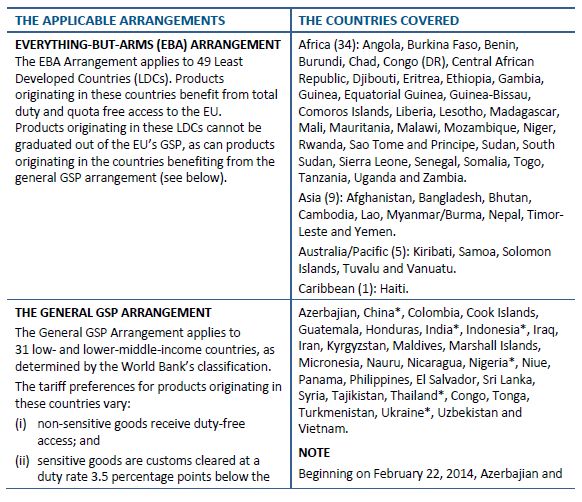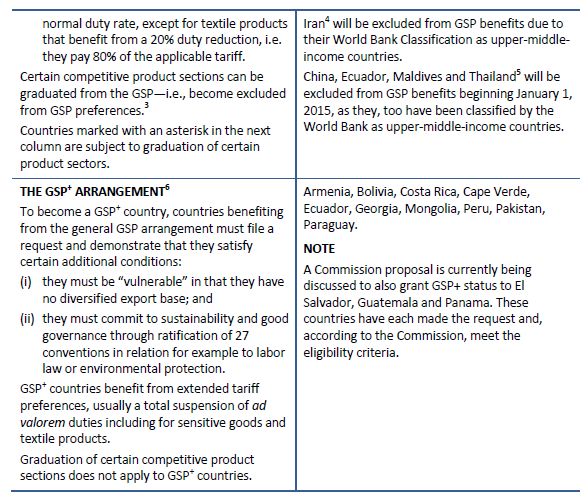Keywords: European Union, GSP arrangements
The reformed Generalized System of Preferences (GSP)1 of the European Union entered into force on January 1, 2014.2 Prior to the effective date, the EU published the lists of beneficiary countries for the different types of GSP arrangements.
The table below highlights the EU's new GSP arrangements.


The number of countries covered by the GSP has been almost halved as compared to the previous regime. The more than 80 countries that were excluded from coverage as of January 1 can roughly be divided into three groupings:
(i) the EU's "OCTs" (overseas countries and territories such as Aruba and Bermuda) that already have preferential market access to the EU;
(ii) countries with other market access arrangements, such as a number Mediterranean countries or countries with which the EU has concluded Economic Partnership Arrangements; and
(iii) a number of high-income countries, such as Saudi Arabia and Kuwait.
The status of beneficiary countries—e.g. their World Bank classification, GSP+ eligibility criteria or graduation criteria—will be subject to regular review, and changes will be published in the Official Journal in advance of the actual entry into force of such changes. For example, the intention to remove China, Ecuador, Maldives and Thailand as beneficiary countries was published on December 31, 2013, and will apply as of January 1, 2015.
The GSP's product coverage has largely remained the same, with a limited number of new products being added to it. This new GSP will apply from 2014 to 2023, but subject to the above-mentioned regular review.
The rules of origin that apply to determine whether products are entitled to the GSP preferences mentioned above are those that are set forth in Articles 66 to 97 of Commission Regulation 2454/93.
Footnotes
1 Regulation 978/2012 (OJ No L 303 of 31 October 2012).
2 For more information, see our May 11, 2011, Legal Update, "The European Commission Unveils Plans to Restrict the EU's General System of Preferences" available at http://www.mayerbrown.com/publications/The- European-Commission-Unveils-Plans-to-Restrict-The- EUs-General-System-of-Preferences-05-11-2011/.
3 Regulation 1213/2012 (OJ No L348 of 18 December 2012) lists those product sectors that have been graduated from GSP for the period January 1,.2014 to December 31, 2016. The Regulation graduates most product sections for China, while graduating more limited product sections for India, Indonesia, Nigeria, Ukraine and Thailand. The Regulation also contained graduated sectors for Costa Rica and Ecuador, but since these have in the meantime become GSP+ countries, this graduation does not apply.
4 Regulation 154/2013 (OJ No L48 of 21 February 2013).
5 Regulation 1421/2013 (OJ No L355 of 31 December 2013).
6 Regulation 1/2014 (OJ No L1 of 4 January 2014).
Learn more about our International Trade practice.
Originally published January 14, 2014
Visit us at mayerbrown.com
Mayer Brown is a global legal services provider comprising legal practices that are separate entities (the "Mayer Brown Practices"). The Mayer Brown Practices are: Mayer Brown LLP and Mayer Brown Europe – Brussels LLP, both limited liability partnerships established in Illinois USA; Mayer Brown International LLP, a limited liability partnership incorporated in England and Wales (authorized and regulated by the Solicitors Regulation Authority and registered in England and Wales number OC 303359); Mayer Brown, a SELAS established in France; Mayer Brown JSM, a Hong Kong partnership and its associated entities in Asia; and Tauil & Chequer Advogados, a Brazilian law partnership with which Mayer Brown is associated. "Mayer Brown" and the Mayer Brown logo are the trademarks of the Mayer Brown Practices in their respective jurisdictions.
© Copyright 2014. The Mayer Brown Practices. All rights reserved.
This Mayer Brown article provides information and comments on legal issues and developments of interest. The foregoing is not a comprehensive treatment of the subject matter covered and is not intended to provide legal advice. Readers should seek specific legal advice before taking any action with respect to the matters discussed herein.


